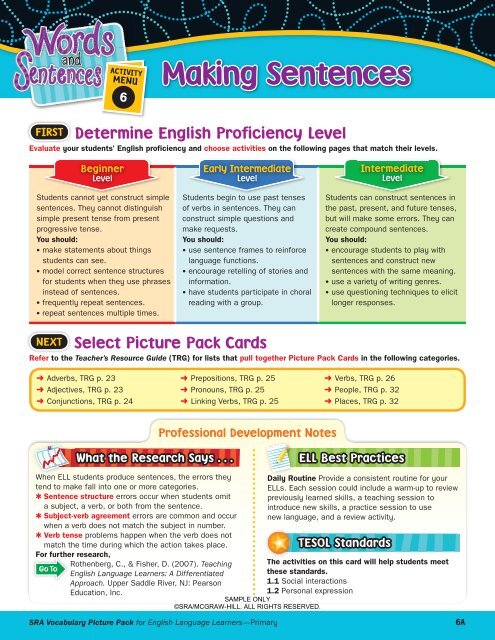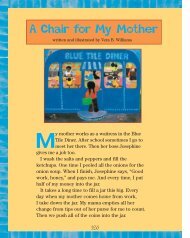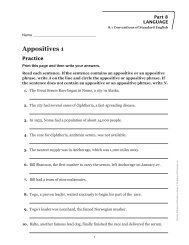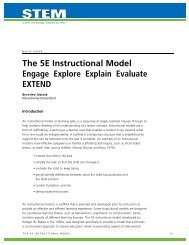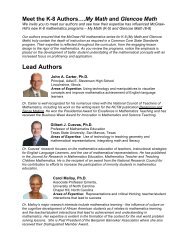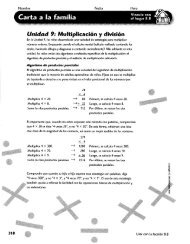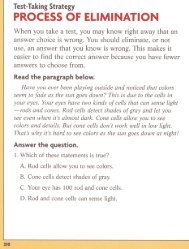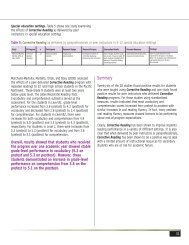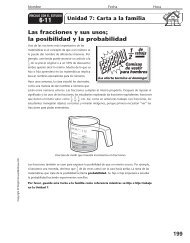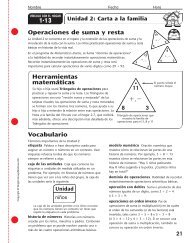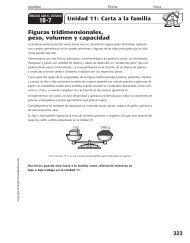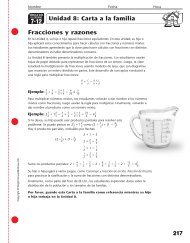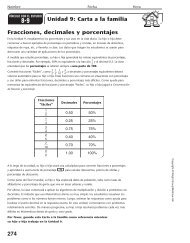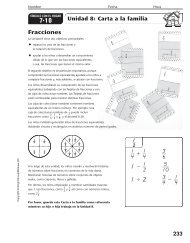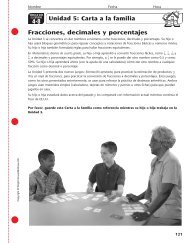Making Sentences - MHEonline.com
Making Sentences - MHEonline.com
Making Sentences - MHEonline.com
You also want an ePaper? Increase the reach of your titles
YUMPU automatically turns print PDFs into web optimized ePapers that Google loves.
ACTIVITY<br />
MENU<br />
6<br />
<strong>Making</strong> <strong>Sentences</strong><br />
Determine English Proficiency Level<br />
Evaluate your students’ English proficiency and choose activities on the following pages that match their levels.<br />
Beginner<br />
Level<br />
Students cannot yet construct simple<br />
sentences. They cannot distinguish<br />
simple present tense from present<br />
progressive tense.<br />
You should:<br />
• make statements about things<br />
students can see.<br />
• model correct sentence structures<br />
for students when they use phrases<br />
instead of sentences.<br />
• frequently repeat sentences.<br />
• repeat sentences multiple times.<br />
Early Intermediate<br />
Level<br />
Students begin to use past tenses<br />
of verbs in sentences. They can<br />
construct simple questions and<br />
make requests.<br />
You should:<br />
• use sentence frames to reinforce<br />
language functions.<br />
• encourage retelling of stories and<br />
information.<br />
• have students participate in choral<br />
reading with a group.<br />
Intermediate<br />
Level<br />
Students can construct sentences in<br />
the past, present, and future tenses,<br />
but will make some errors. They can<br />
create <strong>com</strong>pound sentences.<br />
You should:<br />
• encourage students to play with<br />
sentences and construct new<br />
sentences with the same meaning.<br />
• use a variety of writing genres.<br />
• use questioning techniques to elicit<br />
longer responses.<br />
Select Picture Pack Cards<br />
Refer to the Teacher’s Resource Guide (TRG) for lists that pull together Picture Pack Cards in the following categories.<br />
➜ Adverbs, TRG p. 23<br />
➜ Adjectives, TRG p. 23<br />
➜ Conjunctions, TRG p. 24<br />
➜ Prepositions, TRG p. 25<br />
➜ Pronouns, TRG p. 25<br />
➜ Linking Verbs, TRG p. 25<br />
What the Research Says . . .<br />
When ELL students produce sentences, the errors they<br />
tend to make fall into one or more categories.<br />
✱ Sentence structure errors occur when students omit<br />
a subject, a verb, or both from the sentence.<br />
✱ Subject-verb agreement errors are <strong>com</strong>mon and occur<br />
when a verb does not match the subject in number.<br />
✱ Verb tense problems happen when the verb does not<br />
match the time during which the action takes place.<br />
For further research,<br />
Rothenberg, C., & Fisher, D. (2007). Teaching<br />
English Language Learners: A Differentiated<br />
Approach. Upper Saddle River, NJ: Pearson<br />
Education, Inc.<br />
Professional Development Notes<br />
➜ Verbs, TRG p. 26<br />
➜ People, TRG p. 32<br />
➜ Places, TRG p. 32<br />
ELL Best Practices<br />
Daily Routine Provide a consistent routine for your<br />
ELLs. Each session could include a warm-up to review<br />
previously learned skills, a teaching session to<br />
introduce new skills, a practice session to use<br />
new language, and a review activity.<br />
The activities on this card will help students meet<br />
these standards.<br />
1.1 Social interactions<br />
1.2 Personal expression<br />
SAMPLE ONLY<br />
©SRA/MCGRAW-HILL. ALL RIGHTS RESERVED.<br />
TESOL Standards<br />
SRA Vocabulary Picture Pack for English Language Learners—Primary 6A
Beginner<br />
Level Activities<br />
Graphic Organizers Guided Instruction<br />
Practicing Subject-Verb<br />
Recognizing Pronouns Sort photos according<br />
to a corresponding pronoun.<br />
1. Review and post the he, she, and they sight<br />
word cards.<br />
2. Distribute the Recreation photo cards to small<br />
groups of students. Have groups work together<br />
to sort the cards on the Sorting Mat according<br />
to the corresponding pronoun.<br />
EXAMPLE basketball: they; tennis: he;<br />
bowling: she<br />
3. As you are reviewing the groups, model<br />
sentences, and have students repeat.<br />
EXAMPLE They play basketball.<br />
Oral Language Practice<br />
Picture Stories Compose sentences<br />
about a picture.<br />
1. Have students select any card and draw a<br />
picture that shows the concept on the card.<br />
2. When students are finished, select a student’s<br />
photo and ask questions about it.<br />
EXAMPLE hurricane Display the student’s<br />
drawing, and ask the student: Is it windy?<br />
Student says: Yes. You say: It is windy. Have<br />
students repeat.<br />
3. Continue with the same drawing until you have<br />
modeled three sentences.<br />
Photo Descriptions Describe what is<br />
happening in a photo.<br />
1. Select a photo card that shows an action.<br />
EXAMPLE walking, volleyball<br />
2. Model several sentences that describe what is<br />
going on in the picture. Use a <strong>com</strong>bination of<br />
plural and singular nouns to model subject/verb<br />
agreement. EXAMPLE Say: They are walking.<br />
Agreement Recognize that a verb must change<br />
if the number of the subject changes.<br />
1. Review several Animals photo cards. Show a<br />
card, and have students tell what the object is.<br />
Model a sentence. EXAMPLE Show cat, and<br />
say: This cat is an animal.<br />
2. Have students say your sentence. Repeat for<br />
several animals.<br />
3. Show two Animals cards, and model a new<br />
sentence. EXAMPLE Show cat and dog, and<br />
say: The cat and the dog are animals.<br />
Understanding Possessive<br />
Pronouns Identify ownership with possessive<br />
pronouns.<br />
1. Review and post the his, her, your, and my<br />
sight word cards.<br />
2. Identify objects in the classroom. Ask who the<br />
owner is. EXAMPLE Pick up a student’s pencil<br />
and say: Whose is this? Students point to the<br />
correct student. You say: Yes, this is Albert’s<br />
pencil. This is his pencil. Have students repeat:<br />
his pencil.<br />
3. Repeat the activity for her, my, and your.<br />
4. If students understand, have them repeat the<br />
sentences you are modeling. EXAMPLE This is<br />
her book. This is my marker. This is your paper.<br />
Use “To Be”<br />
The is/are .<br />
EXAMPLE<br />
• The cat is an animal.<br />
• The fish are animals.<br />
Extend the Frame<br />
• The dog and the cat are animals.<br />
• Is the cat an animal?<br />
SAMPLE ONLY<br />
©SRA/MCGRAW-HILL. ALL RIGHTS RESERVED.<br />
Sentence Frames<br />
6B SRA Vocabulary Picture Pack for English Language Learners—Primary
Guided Instruction<br />
Expressing Reasons Talk about<br />
likes and dislikes, and give reasons.<br />
1. Review the Food photo cards with students.<br />
Ask students whether they like certain foods<br />
or not. EXAMPLE Show lemons, and say: Do<br />
you like lemons? The student might say: No,<br />
I don’t like lemons.<br />
2. Ask students to explain. EXAMPLE You ask:<br />
Why? Student might say: They are sour.<br />
3. Continue with several students, and write their<br />
sentences on the board. Model <strong>com</strong>bining the<br />
sentences with the word because.<br />
EXAMPLE I don’t like lemons because they<br />
are sour.<br />
Grammar Extension Point out that the pronoun<br />
agrees in number with the noun. EXAMPLE I don’t<br />
like lemons because they are sour.<br />
<strong>Making</strong> New <strong>Sentences</strong> Vary the<br />
pronouns in the same sentence structure.<br />
1. Post the following action verb sight word cards<br />
on the board: ask, eat, jump, play, and sleep.<br />
Pantomime each word.<br />
2. Have students sit in a circle. Show one of the<br />
cards, and say a simple sentence with a<br />
subject pronoun. EXAMPLE You eat bananas.<br />
3. Pass the card to the next student, and have<br />
him or her say the same sentence with a new<br />
subject pronoun. EXAMPLE You say: He.<br />
Student says: He eats bananas.<br />
4. Continue around the circle, and then begin<br />
again with a new verb.<br />
Use Time Signal Words<br />
He/She after .<br />
EXAMPLE<br />
• He plays soccer after school.<br />
• She walks the dog after dinner.<br />
Extend the Frame<br />
• They do homework before class.<br />
• We talk during dinner.<br />
Sentence Frames<br />
Early Intermediate<br />
Level Activities<br />
SAMPLE ONLY<br />
©SRA/MCGRAW-HILL. ALL RIGHTS RESERVED.<br />
Kinesthetic Support<br />
Recognizing a Complete Sentence Use<br />
movement to show if a sentence is <strong>com</strong>plete.<br />
1. Select and review several photo cards.<br />
2. Describe a photo with a sentence or a phrase.<br />
Have students clap if your statement is a<br />
<strong>com</strong>plete sentence or stomp their feet if it is<br />
in<strong>com</strong>plete. EXAMPLE Show ball, and say: Red<br />
ball. Students should stomp their feet.<br />
3. After students stomp their feet for an<br />
in<strong>com</strong>plete sentence, change it to a <strong>com</strong>plete<br />
sentence, and have students repeat. Emphasize<br />
the missing <strong>com</strong>ponent when you model the<br />
<strong>com</strong>plete sentence. EXAMPLE The ball is red.<br />
Oral Language Practice<br />
Using Sight Words Practice using<br />
sight words with terms and phrases.<br />
1. Choose photo cards that include words that<br />
start with vowels.<br />
2. Pair articles or other words from the sight word<br />
cards with the cards you chose. EXAMPLE an<br />
airplane, a car, her motorcycle, his bicycle<br />
3. Have students <strong>com</strong>bine other sight words and<br />
photo cards to create <strong>com</strong>plete sentences.<br />
Have students read their sentences aloud.<br />
Extending <strong>Sentences</strong> Use signal<br />
words to add meaning to sentences.<br />
1. Sit in a circle with students. Show a card, and<br />
say a simple sentence about it. EXAMPLE Show<br />
soccer, and say: He plays soccer.<br />
2. Have the next student in the circle add one or<br />
more words to the sentence. Any words are<br />
fine, as long as the sentence is grammatically<br />
correct. Make suggestions, if necessary.<br />
EXAMPLE He plays soccer after school.<br />
3. Continue around the circle until students can’t<br />
think of more words to modify the sentence.<br />
EXAMPLE He always plays soccer with his friends<br />
after school.<br />
To order materials call 1-888-772-4543 • Visit SRAonline.<strong>com</strong> 6C
Guided Instruction<br />
Using Conditional Clauses Use a<br />
conditional clause to finish a sentence.<br />
1. Select a set of photo cards to review.<br />
2. Show a card and model a sentence that<br />
includes the word on the card in a conditional<br />
clause. EXAMPLE Say: If I had an elephant,<br />
I would ride it to the park.<br />
3. Show another card to students and give the<br />
beginning of a conditional sentence. Have a<br />
student <strong>com</strong>plete the sentence aloud.<br />
EXAMPLE Show helicopter, and say: If I had<br />
a helicopter . . . Student might say: If I had<br />
a helicopter, I would fly to New York City.<br />
4. When students understand the activity, have<br />
them work with partners to create conditional<br />
sentences and practice them repeatedly.<br />
Build Vocabulary Vary the verbs in your<br />
conditional clauses. EXAMPLE If I had/saw/could<br />
ride in . . .<br />
Oral Language Practice<br />
Combining <strong>Sentences</strong> Work on noun-pronoun<br />
agreement when creating <strong>com</strong>pound sentences.<br />
1. Review several cards from any set of related<br />
photo cards.<br />
2. Ask a student the same question about two<br />
different cards. EXAMPLE Have you ever been<br />
in a police station? Have you ever been in a<br />
grocery store?<br />
3. Use the student’s answers to create one<br />
sentence about the two cards. EXAMPLE Nora<br />
has been in a grocery store, but she hasn’t been<br />
in a police station.<br />
4. Give two cards to each student. Have pairs<br />
interview one another and then <strong>com</strong>bine the<br />
two ideas into one sentence.<br />
Intermediate<br />
Level Activities<br />
SAMPLE ONLY<br />
©SRA/MCGRAW-HILL. ALL RIGHTS RESERVED.<br />
Independent Practice<br />
Using Signal Words Create longer sentences<br />
with signal words.<br />
1. Gather and review the following sight word<br />
cards: after, and, before, but, if, and so. Write<br />
the words or post the cards on the board.<br />
Assign each a number from 1 through 6.<br />
2. Organize small groups. Have one student in<br />
each group roll a number cube and create a<br />
sentence that includes the corresponding word.<br />
EXAMPLE Student rolls a 3 (before), and says:<br />
We study science before we eat lunch.<br />
Variation Challenge students to build on group<br />
members’ sentences to create a story.<br />
Independent Learning Strategies<br />
Self-Reliance Since learning extends beyond<br />
the walls of the school, encouraging students to<br />
discover things on their own will be a helpful tool.<br />
Introduce students to the class picture dictionary<br />
and thesaurus and any available online resources.<br />
Remind them that these resources are for students<br />
to use at any time, and encourage students to use<br />
them frequently.<br />
Sentence Frames<br />
Talk about Experiences<br />
She/He has , but she/he<br />
hasn’t .<br />
EXAMPLE<br />
• She has been to a movie, but she hasn’t been to<br />
a play.<br />
• He has visited Mexico, but he hasn’t visited<br />
Canada.<br />
Extend the Frame<br />
• She has been to a movie, but he hasn’t been to<br />
a movie.<br />
• I have tried yoga, but I haven’t tried dancing.<br />
6D SRA Vocabulary Picture Pack for English Language Learners—Primary<br />
Copyright © The McGraw-Hill Companies. All rights reserved.


